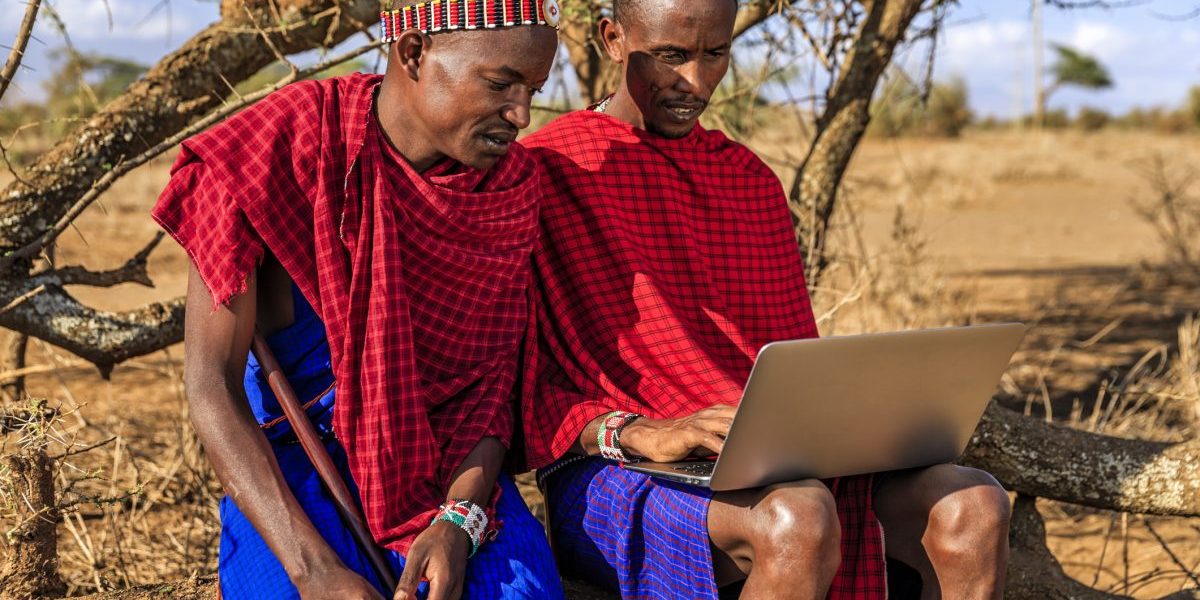India’s G20 presidency spotlighted the pivotal role of digital public infrastructure in fostering sustainable and inclusive development. Such a network is crucial for Africa’s rapidly expanding digital landscape. Yet without strategic actions the continent risks succumbing to a new type of resource curse — the digital one.
The digital revolution presents Africa with an opportunity to break free from its slow development trajectory and emerge as a sovereign and innovative digital player on the global stage. However, in the face of emerging digital geopolitics between democracies and autocratic regimes vying for dominance in the untapped African digital market, Africa must define its digital sovereignty. The US, China and Europe are currently Africa’s top three digital market share competitors. Each has its own unique digital governance model, which can range from market-driven to human-centric and state-centred, and could have a significant effect on the future trajectory of the continent.
Research by the SA Institute of International Affairs highlights the powerful geopolitical systems at play that are affecting Africa in the cyber sphere. In the ever-changing and unpredictable digital landscape, African policymakers must take charge and shape the continent’s digital sovereignty according to their vision. To liberate the continent from its historical role as a marginalised participant in global supply chains it must strategically pursue digital development that aligns with its developmental requirements and reinforces digital sovereignty and democracy. How can Africa assert its influence, take on agenda-setting roles in the data governance community and firmly define its digital sovereignty?
The competition for Africa’s tech future
The global economy’s competitiveness is dependent on the efficient collection, analysis and utilisation of extensive data to gain crucial insights and strategic advantages. World leaders have long acknowledged this truth. In 2013 Chinese leader Xi Jinping drew a parallel between data and oil, highlighting its immense potential for productivity and opportunities. He underscored that those who wield big data technologies will possess the key to development and a significant competitive advantage.
Africa’s technological future hinges on its imperative to connect the continent to the internet. However, there is a significant digital divide between Africa and the rest of the world, prompting China, the US and Europe to intensify their competition to tap into this largely underserved market. The strategic importance of expanding their presence in Africa is not lost on both the East and the West. Africa is an enticing market for these players because by 2050 it will have the world’s largest youthful population.
To enter this digital market digital infrastructure has to be rolled out, which is why there are many initiatives aimed at bringing the continent online. Examples include Google’s 15,000km subsea cable that travels from Portugal to SA, with branches in Namibia, Togo and Nigeria, the Chinese Digital Silk Road, most recently the new Huawei innovation centre in SA, and the New Africa-Europe Digital Economy Partnership.
In various regions across Africa numerous technology innovation hubs have emerged, showcasing the budding potential of Africa’s tech landscape. However, the infancy of Africa’s tech landscape has led to an over-reliance on foreign partners to provide digital infrastructure. External actors could thus wield significant control over data, platforms, and technologies, leaving African nations vulnerable to manipulation, exploitation, and digital colonialism.
Digital platforms and companies from abroad frequently collect vast amounts of data from African users, which can be used to shape narratives, influence decision-making and extract economic value. This data extraction may occur without adequate consent or benefit-sharing for the African people. There is also the risk of the content on the internet not aligning with the cultural norms of African states as it does not originate from them. A study by the Annals of the American Association of Geographers revealed that most African countries rely on content produced by America, and only eight African countries have locally produced content.
A call for sovereignty
Despite some progress that has seen an increase in the number of African countries that have at least one form of data protection law from 12 to 28 between 2012 and 2021, many African countries still lack comprehensive and enforceable policies specifically designed to define and protect African digital sovereignty. The absence of strong regulations may lead to exploitative practices and pose a challenge in safeguarding digital sovereignty.
Weak data protection laws and enforcement mechanisms also expose African citizens’ personal data to misuse and unauthorised access by external actors. While individual state-level policies focusing on improving access have been more achievable, with only five African countries that did not have any digital strategy in 2021, the development of frameworks for digital rights has been less successful, despite the increasing presence of local and continental digital rights groups.
Digital sovereignty in Africa revolves around two elements: that the continent should have autonomy over its extracted data, and that content about Africa should largely originate from African sources. This requires Africa to take full responsibility for planning its digital future, procuring its own digital infrastructure, and crafting robust frameworks to regulate the digital sphere.
Achieving success in this endeavour requires integrated and unified action from the continent, rather than fragmented efforts. Addressing the current situation necessitates significant changes to fully embrace and assert African digital sovereignty.
The way forward
Efforts must be made to enhance the continent’s internet penetration rate and establish a robust, integrated continental digital infrastructure that improves access, speed and competition levels. At 36%, Africa’s internet penetration compares poorly with Asia’s internet penetration rate of 67.4%. Achieving this goal necessitates fostering collaboration among all stakeholders — ICT government departments, civil society organisations, the private sector and African financial institutions such as the African Development Bank, to establish projects aimed at improving the internet penetration rate, and to fund them.
The African Union (AU) and regional economic communities should develop frameworks and harmonised country-level strategies to accelerate regional digital integration and leverage the fourth industrial revolution through adopting a holistic approach that addresses infrastructure development, digital inclusion, education and skills, and ensures the data sovereignty of African governments. The recently published AU Data Policy Framework could play an important synthesising role in this regard.
Privacy by design and human rights in digital governance policies and the strengthening of regulation/implementation capabilities should be prioritised. This is to ensure the de facto protection of citizen privacy and safeguard against the abuse of biometric data and spyware, the suppression of growing public discontent, and the further marginalisation of historically vulnerable groups.
The AU and regional economic communities should focus on strengthening the digital innovation and incubator ecosystem. This will empower local innovators to incubate and fund their ideas for scaling up. Incentivising innovation systems and fostering awareness of foresight frameworks are vital. Additionally, establishing stronger connections between industry, research/academia, and policy actors through triple-helix platforms (the best example of which is Silicon Valley) can enhance the overall innovation system.
Africa could leverage this digital revolution to reposition and introduce itself as an influential actor in the global tech landscape. The continent may have leverage despite having a small IT industry thanks to its expanding consumer base. Yet domestic activity must also motivate the continent’s longer-term capacity to exercise its sovereignty.
In this regard, legislative reform to reduce red tape for start-up tech enterprises, larger incentives through tax refunds and, most crucially, advancements in the education of a new generation of digital-savvy business owners, are required to create desired digital futures for the continent.







